
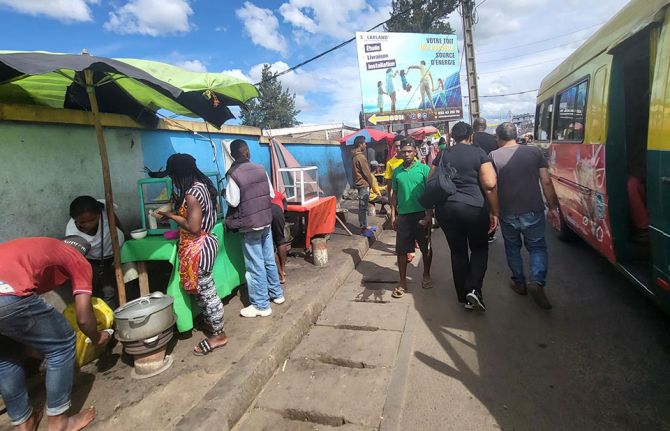
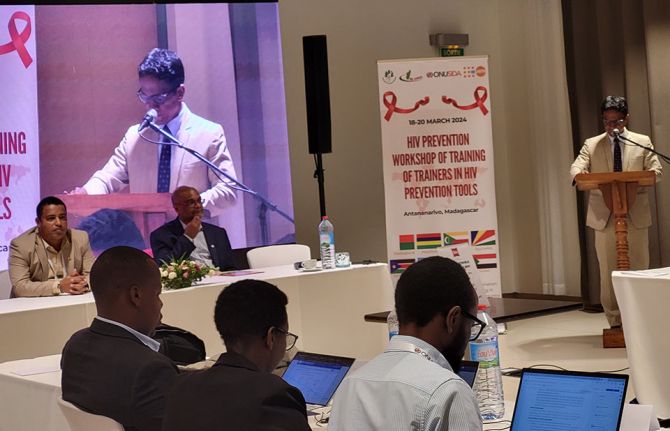
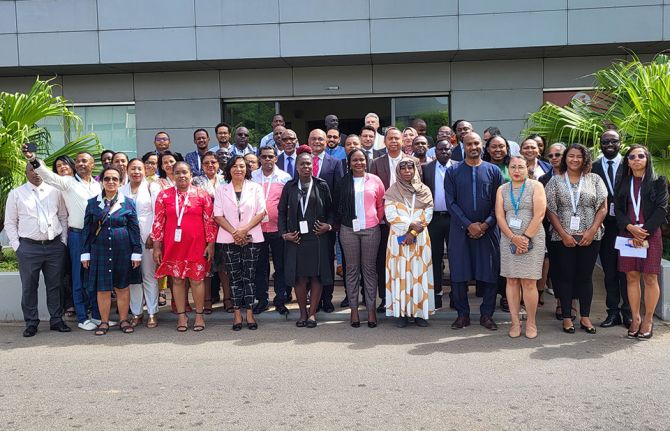
Press Release
UNAIDS urges Indian Ocean Island countries to strengthen HIV prevention to end AIDS
27 March 2024 27 March 2024ANTANANARIVO/GENEVA, 27 March 2024—Despite progress across most of sub-Saharan Africa, UNAIDS warns that gaps in HIV prevention are driving new HIV infections in the Indian Ocean Countries (IOC) and several other countries in Africa. The critical gaps in HIV prevention were the focus of a workshop organized by UNAIDS and UNFPA which was hosted in Madagascar between 18 and 20 March to address some of the barriers to accelerating progress.
Insufficient focus on HIV prevention in a number of African countries including Egypt, Madagascar, Angola, Sudan and South Sudan has resulted in these countries not achieving the proportionate declines in new infections seen in the rest of the region.
For example, the increase in the number of new infections in a country like Madagascar for example, is in stark contrast to the downward trend in Botswana which has seen a 66% decline in new HIV infections since 2010 and 36% decline in AIDS-related deaths during the same period. As a result, Botswana—along with Eswatini, Rwanda and Zimbabwe— are on the path to end AIDS having achieved the global 95-95-95 targets through strong HIV prevention and treatment interventions.
Madagascar, one of the poorest countries in the region, has been hit by cyclical natural disasters including drought and cyclones, making it difficult for the country to recover and mount an effective response to HIV. Madagascar recorded a 151% increase in the number of new HIV infections since 2010, and a 279% increase in AIDS-related deaths during the same period. In addition, just 18% of the estimated 70 000 people living with HIV in Madagascar had access to treatment in 2022, and 3200 people died of AIDS-related illnesses. Sudan and South Sudan are also falling behind on HIV prevention and treatment efforts. Inequalities are exacerbating people’s vulnerability to HIV.
“Local research indicates increases in new HIV infections among key populations, including people who use drugs, and among young women and girls. This could be attributable to many factors including drug routes, recurring cyclones and deep poverty in some areas that is making people more vulnerable to HIV infections,” said Professor Zely Randriamanantany, Madagascar’s Minister of Public Health. “We need our international partners to invest with us before it's too late. This prevention focus is very welcome indeed."
“It is clear from our visits to communities and from speaking to health specialists in Madagascar, that the HIV epidemic is changing. The persistent rise in new infections in Madagascar since 2010, for example, shows that it could spread rapidly if we do not stop it in its tracks immediately,” said Anne Githuku-Shongwe, UNAIDS Regional Director for Eastern and Southern Africa. “We know the path that ends AIDS. It’s not a miracle. It requires strong political and financial support.”
Gaps identified in some countries include a lack of data that would point to where HIV prevention efforts need to focus. Data gathering interventions are key to implementing evidence-informed and effective programmes. Some countries are also lacking commodities, including HIV testing kits and condoms.
“Inadequate investment in HIV responses is holding back ending AIDS as a public health threat,” said Jude Padayachy, UNAIDS Country Director for Comoros, Madagascar, Mauritius and Seychelles. “We need to accelerate the HIV response in the Indian Ocean Island states by ensuring all the basics—making sure people are informed about HIV and how to prevent it, and making sure people have access to HIV prevention services and commodities, such as condoms. We also need to make sure that people who are HIV-positive know their status and get the treatment they need.”
UNAIDS is committed to support countries to accelerate political leadership, investments and better data for prevention.
The meeting in Madagascar brought together HIV experts and programme leaders from a number of countries across Africa to learn from each other and to review and strengthen their national plans on HIV prevention to support countries in scaling up their HIV responses. The meeting included teams from Comoros, Egypt, Madagascar, Rwanda, Sudan and South Sudan.
Participants explored ways to improve data collection to help develop more of an understanding of the dynamics of their HIV epidemics to ensure an effective, evidence-informed, human rights-based response. They also drafted national assessments which will serve as a guide to facilitate dialogues with communities, governments, and partners. This will aid in refining strategies and setting priorities to implement ambitious HIV prevention plans. UNAIDS will continue to support countries in their internal assessments to strengthen their HIV responses.
UNAIDS
The Joint United Nations Programme on HIV/AIDS (UNAIDS) leads and inspires the world to achieve its shared vision of zero new HIV infections, zero discrimination and zero AIDS-related deaths. UNAIDS unites the efforts of 11 UN organizations—UNHCR, UNICEF, WFP, UNDP, UNFPA, UNODC, UN Women, ILO, UNESCO, WHO and the World Bank—and works closely with global and national partners towards ending the AIDS epidemic by 2030 as part of the Sustainable Development Goals. Learn more at unaids.org and connect with us on Facebook, Twitter, Instagram and YouTube.
Contact
UNAIDS JohannesburgBathsheba OKWENJE
tel. + 27 (0) 72 895 5174
okwenjeb@unaids.org
UNAIDS Johannesburg
Robert SHIVAMBU
tel. +27 (0) 83 608 1498
shivambuh@unaids.org
Our work
Region/country

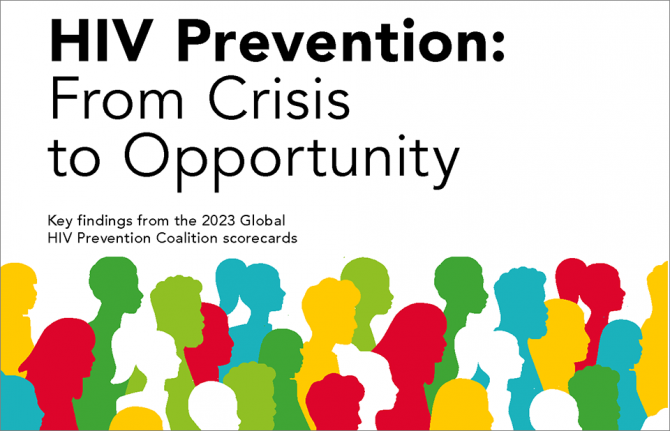

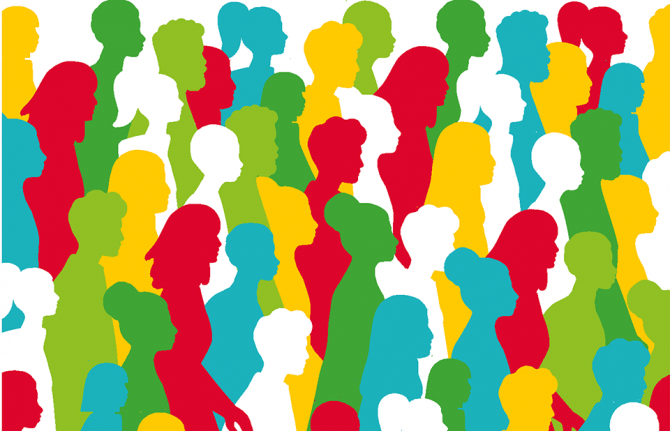
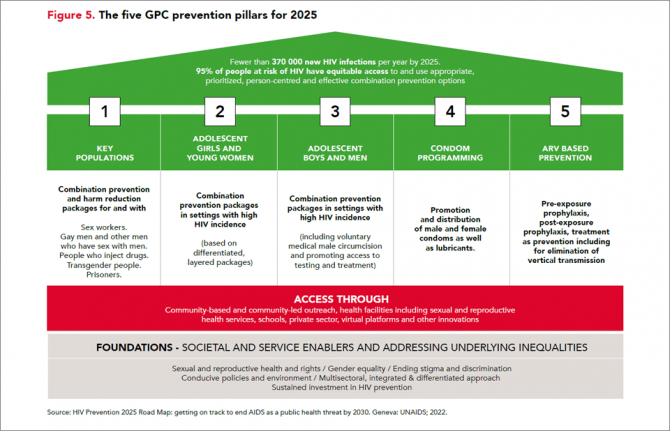
Press Release
Reductions in new HIV infections in several Global HIV Prevention Coalition countries, but global progress needs to be accelerated
13 March 2024 13 March 202413 March 2024—A new report, HIV Prevention: From Crisis to Opportunity shows that HIV infections continue to decline in countries that are part of the Global HIV Prevention Coalition (GPC) faster than in the rest of the world.
Eleven GPC focus countries have reduced their annual number of new HIV infections by at least 66% since 2010. By comparison, the average reduction in new HIV infections since 2010 globally is 38%. The GPC is a coalition of 38 countries working together to accelerate declines in new HIV infections to achieve the target of having 95% of the people who are at risk of HIV accessing effective combination prevention options.
The GPC countries that have prioritised primary prevention and treatment and that have focused on reaching people most at risk have secured the strongest consistent declines in new HIV infections.
Globally, progress in HIV prevention has been highly uneven and a majority of the world’s countries are not currently on track to achieve the 2025 targets. Indeed, several countries are experiencing prevention crises with low access to services and face record rising new HIV infections.
“The findings of this report offer crucial lessons for action,” said Angeli Achrekar, Deputy Executive Director Programme, UNAIDS. “The report shows that sustained political leadership, investment in effective HIV prevention programmes, and an enabling policy environment are crucial to end AIDS as a public health threat by 2030.”
Declines in new HIV infections have been boosted by the cumulative impact of combination HIV prevention options and increased access to antiretroviral treatment which has also increased viral suppression in people living with HIV. People who are on treatment and are virally supressed cannot transmit HIV.
“It’s remarkable to see what has been achieved in the AIDS response in the past 20 years. But the progress to date has not been equitable and is not yet sustainable, and we must never confuse progress with being sure of success,” said Mitchell Warren, GPC co-chair and Executive Director, AVAC. “Our progress is fragile, and what we’ve achieved today could slip away even more quickly than it was achieved if we let complacency take hold.”
Key populations and adolescent girls and young women are still at high risk of new infections
HIV incidence remains unacceptably high among populations where gaps in HIV prevention investments persist. This includes key populations in all regions globally and adolescent girls and young women in parts of sub-Saharan Africa.
Around 3100 young women and girls aged 15-24 became newly infected with HIV every week in sub-Saharan Africa in 2022 and HIV incidence declined less rapidly than it has among young men. Only 43% of the sub-national areas in which there is elevated HIV incidence among young women are being reached with dedicated prevention programmes for young women.
Although GPC countries have shown solid gains in reducing new HIV infections, challenges remain worldwide in reaching key populations most at risk of new HIV infections including men who have sex with men, sex workers and people who inject drugs. Every week, more than 11 000 new HIV infections occur among key populations and their sexual partners globally.
Only 44% of sex workers, 28% of gay men and other men who have sex with men, and 37% of people who inject drugs accessed two or more HIV prevention services in the previous three months according to median values reported by GPC countries ––against a target of 90%.
HIV prevention is being obstructed by shortfalls in prevention financing, and by punitive laws. Social stigma, violence, discrimination and social exclusion are barriers to key populations’ access to health-care services and information, exacerbating their risk of acquiring HIV. Law reform is a crucial enabler of prevention programmes. Protecting the human rights of everyone is vital for protecting the health of everyone.
Investments in both condom and voluntary medical male circumcision programmes, which are both effective in preventing HIV, have fallen in some of the countries with the largest HIV epidemics. In addition, breakthrough HIV prevention options such as pre-exposure prophylaxis (PrEP), medicine to prevent HIV, are still only available to a small fraction of the people who need them.
There are unprecedented opportunities for HIV prevention in 2024. There is a growing array of prevention options including existing tools and new long-acting prevention technologies, as well as country examples of how to implement prevention at scale and increase choices available to communities.
HIV Prevention programmes need to be at scale, efficient and equitable. The actions that are needed for success and sustainability are known, have been shown to work, and have been agreed: collaborate, follow science, tackle inequalities, protect everyone’s rights, let communities lead, and invest in what is needed. Sliding back on resourcing or inclusion would hurt everyone. Solidarity will benefit everyone. Communities, countries and international partners can prevent new infections – together.
UNAIDS
The Joint United Nations Programme on HIV/AIDS (UNAIDS) leads and inspires the world to achieve its shared vision of zero new HIV infections, zero discrimination and zero AIDS-related deaths. UNAIDS unites the efforts of 11 UN organizations—UNHCR, UNICEF, WFP, UNDP, UNFPA, UNODC, UN Women, ILO, UNESCO, WHO and the World Bank—and works closely with global and national partners towards ending the AIDS epidemic by 2030 as part of the Sustainable Development Goals. Learn more at unaids.org and connect with us on Facebook, Twitter, Instagram and YouTube.
Our work

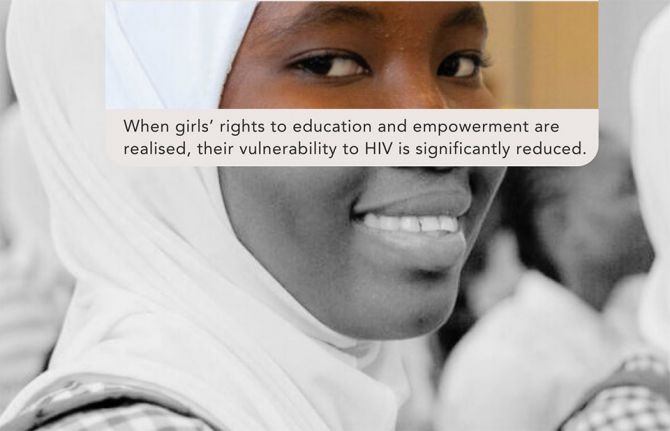
Press Release
At the 68th Commission on Status of Women UNAIDS calls for action to achieve gender equality and end AIDS
11 March 2024 11 March 2024GENEVA/NEW YORK, 11 March 2024 - UNAIDS is gearing up for the 68th session of the Commission on the Status of Women (#CSW68) which begins today and will run until 22 March 2024. #CSW68, the United Nations largest annual gathering on gender equality and women’s empowerment, is being held this year under the priority theme, Accelerating the achievement of gender equality and the empowerment of all women and girls by addressing poverty and strengthening institutions and financing with a gender perspective.
Despite progress, no country has achieved gender equality to date, and violations of women’s human rights and gender-based violence are continuing to fuel the AIDS pandemic. The world is off track to meet the gender targets set out in the Sustainable Development Goals (SDGs) and in many of the world’s poorest countries, the debt crisis is squeezing out investment in education, health, and social protection, particularly hurting women and girls.
Around the world today, 129 million girls are out of school, denying them lifesaving information on how to protect themselves from HIV. Every three minutes, an adolescent girl or young woman (15-24 years) acquired HIV in 2022 in sub-Saharan Africa, and across Africa, AIDS remains the leading cause of death among women of reproductive age.
"There can be no more excuses. Ending AIDS among women and girls is not only a moral imperative but also a strategic priority for achieving the Sustainable Development Goals,” said Winnie Byanyima, Executive Director of UNAIDS. “Only by protecting and investing in the rights of women and girls can we protect their health, and only by protecting women’s health can we end the AIDS pandemic. We must seize this opportunity to accelerate progress towards a world where every woman and girl can, not just survive, but thrive."
During #CSW68 UNAIDS will be co-hosting several key events including a high level meeting co-convened by the Grand Duchy of Luxembourg and Education Plus (a joint initiative of UNAIDS, UNESCO, UNFPA, UNICEF and UN Women) which will mobilize government, partners and stakeholders to accelerate scaled up actions on women’s rights and leverage girls’ education for gender equality and HIV prevention across Africa.
UNAIDS is urging renewed action and anticipates strong outcomes from #CSW68. UNAIDS looks forward to the partnerships that will be forged to accelerate progress towards gender equality and ending AIDS as a global public health threat.
UNAIDS remains steadfast in its commitment to working collaboratively with governments, civil society, and other partners to create a world where the rights and dignity of all women and girls are respected and protected, including women and girls living with, at risk of and affected by HIV.
#CSW68, hosted by the United Nations, will convene leaders, advocates, governments, civil society organizations, activists and experts to discuss, agree on actions and investments that can end women’s poverty and advance gender equality.
Follow the Education Plus event live on Tuesday 12 March at 08:00 – 09:30 EST - Making Education Investment Cases Work for Gender Equality and HIV Prevention
UNAIDS
The Joint United Nations Programme on HIV/AIDS (UNAIDS) leads and inspires the world to achieve its shared vision of zero new HIV infections, zero discrimination and zero AIDS-related deaths. UNAIDS unites the efforts of 11 UN organizations—UNHCR, UNICEF, WFP, UNDP, UNFPA, UNODC, UN Women, ILO, UNESCO, WHO and the World Bank—and works closely with global and national partners towards ending the AIDS epidemic by 2030 as part of the Sustainable Development Goals. Learn more at unaids.org and connect with us on Facebook, Twitter, Instagram and YouTube.
Contact
UNAIDS New YorkRupa Bhadra
tel. +1 646 468 4129
bhadrar@unaids.org
UNAIDS Geneva
Sophie Barton Knott
tel. +41 79 5146896
bartonknotts@unaids.org

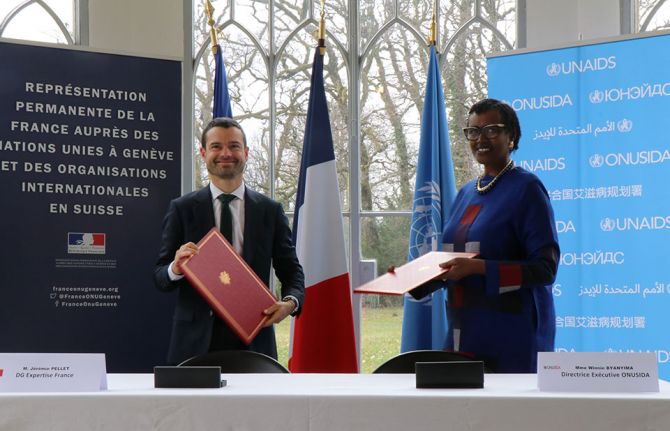
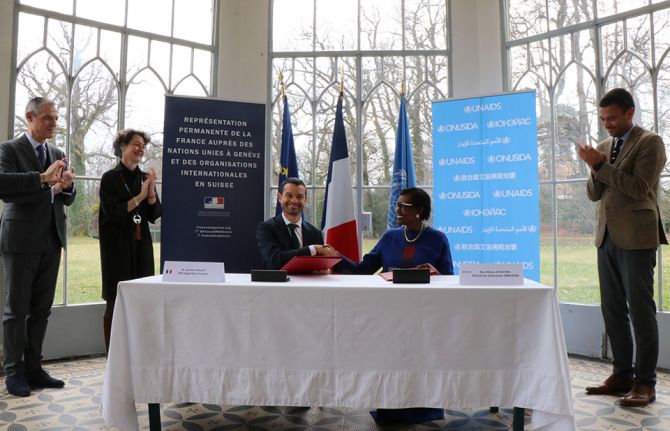
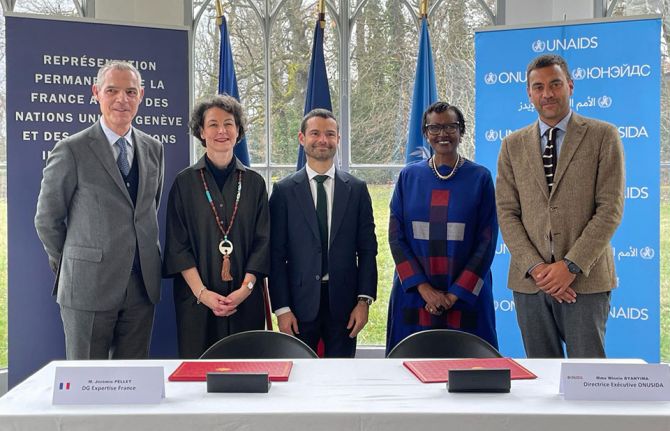
Press Release
Expertise France partners with UNAIDS to fight HIV stigma and discrimination in western and central Africa
28 February 2024 28 February 2024GENEVA, 28 February 2024—The French public international cooperation agency ‘Expertise France’ and UNAIDS have signed a new partnership agreement to fight stigma and discrimination in six western and central African countries.
The aim of the €1.92 million partnership called, "Community response to stigma and discrimination and legislative reform," is to promote access to inclusive HIV services that respect human rights for key populations, including men who have sex with men, people who inject drugs, sex workers, transgender people and young women and adolescent girls in Benin, Cameroon, Côte d'Ivoire, Central African Republic, Senegal and Togo.
"Stigma and discrimination obstruct HIV prevention, testing, treatment and care, and hold back progress towards ending AIDS by 2030,” said Winnie Byanyima, Executive Director of UNAIDS and Under-Secretary-General of the United Nations. “It is only by protecting everyone’s rights that we can protect everyone’s health, so by joining forces with Expertise France we can uphold rights for those in need in the region.”
In the six countries, key populations are disproportionately affected by HIV. In Benin, for example, HIV prevalence in 2022 was 7.2% among sex workers, 8.3% among men who have sex with men and 21.9% among transgender people—while the rate is 0.8% among the general population. In Cameroon, HIV prevalence was 24.3% among sex workers, 20.6% among men who have sex with men and 4% among prisoners—while the rate is 2.6% among the general population.
Anne-Claire Amprou, Global Health Ambassador for France, Ms Byanyima, Jérôme Bonnafont, Permanent Representative of France to the United Nations and Jérémie Pellet, Director General of Expertise France, attended the signing ceremony at the Permanent Mission of France to the United Nations in Geneva, Switzerland.
"This agreement aims to reduce inequalities in access to care and treatment for populations most vulnerable to HIV in western and central Africa. France is thus making a commitment to global health alongside UNAIDS, in an approach based on equity, solidarity and development," said Mr Bonnafont.
Ms Amprou added, "Through this partnership, France is pleased to be able to reaffirm its commitment to strengthening healthcare systems, as well as combatting stigmatization, discrimination and gender inequalities in access to healthcare for the most vulnerable populations, by supporting for community-led efforts.”
As part of the Global AIDS strategy both France and UNAIDS are striving to improve legal and social responses to HIV with a particular focus on reducing gender inequalities and gender-based violence. This new initiative will also aim to reduce systemic barriers by promoting a more favorable legal framework that respects human rights and facilitates better access to legal services.
Jérémie Pellet, Director General of Expertise France said, "This partnership with UNAIDS embodies our commitment to supporting the most vulnerable communities and promoting a more just and inclusive society."
Expertise France via ‘L'Initiative’, an organization which helps national partners prepare and implement projects using funds from the Global Fund to Fight AIDS, Tuberculosis and Malaria, is funding the project. The funds complement efforts under the Global Fund's 7th round of funding, underlining the importance of coordinated action to remove human rights barriers to accessing health services.
Led by the UNAIDS western and central Africa regional office, based in Dakar, the project will be implemented with the support of the Civil Society Institute for HIV and Health, Alliance Côte d'Ivoire and Coalition PLUS.
Expertise France
Expertise France is the French public international cooperation agency. It designs and implements projects which aim to contribute to the balanced development of partner countries, in line with the Sustainable Development Goals (SDGs) of the 2030 Agenda and long-term development.
UNAIDS
The Joint United Nations Programme on HIV/AIDS (UNAIDS) leads and inspires the world to achieve its shared vision of zero new HIV infections, zero discrimination and zero AIDS-related deaths. UNAIDS unites the efforts of 11 UN organizations—UNHCR, UNICEF, WFP, UNDP, UNFPA, UNODC, UN Women, ILO, UNESCO, WHO and the World Bank—and works closely with global and national partners towards ending the AIDS epidemic by 2030 as part of the Sustainable Development Goals. Learn more at unaids.org and connect with us on Facebook, Twitter, Instagram and YouTube.
L’Initiative
France created L’Initiative in 2011 in response to the difficulties that certain countries, particularly French-speaking ones, were having in accessing Global Fund grants. The French Ministry for Europe and Foreign Affairs and Expertise France, the government agency for international technical cooperation, oversee L’Initiative.
Contact
Expertise FranceEric Fleutelot
eric.fleutelot@expertisefrance.fr
UNAIDS Geneva
Charlotte Sector
sectorc@unaids.org

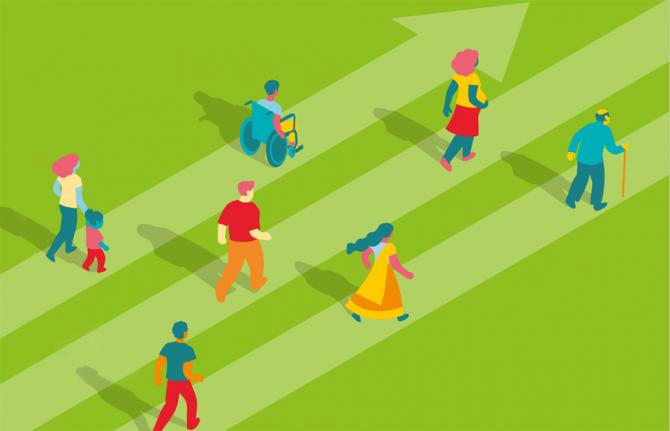
Press Release
Member States negotiating the pandemic instrument have an opportunity to save lives and keep the world safe, says UNAIDS
18 February 2024 18 February 2024As Member States enter the next stage of drafting and negotiating a new Pandemics Prevention, Preparedness and Response Accord, and the targeted revision of the International Health Regulations (IHR), UNAIDS underscores the importance of protecting the gains made in the AIDS response and encourages Member States to use that experience to help prevent and respond to future pandemics and health emergencies.
As part of the Sustainable Development Goals and the 2021 UN Political Declaration on HIV/AIDS, world leaders have committed to ending AIDS as a public health threat by 2030. COVID-19 increased HIV vulnerability and disrupted HIV service access for millions of people around the world. The colliding pandemics of HIV and COVID-19 also led to significant setbacks in the TB response. This experience illustrated powerfully how the impact of other pandemics has the potential to halt and reverse gains achieved in the fight against AIDS.
HIV remains an ongoing pandemic which would be affected by the impact of future pandemics. The actions necessary to make the world safer from future pandemics are vital for ensuring the end of AIDS as a public health threat and for protecting people living with and affected by HIV. Equally, doing what is needed to end AIDS will help keep the world safer from other pandemics.
At UNAIDS, efforts to support Member States in the pandemic treaty negotiations are rooted in evidence. At UNAIDS, we adhere always and only to facts, science, data and the lived experience of the people in the communities and countries where we work to support and guide the HIV response. We resolutely urge that all who are engaging in the negotiations do the same, standing for evidence, and categorically rejecting any misinformation, mischaracterization, or misattribution. The systematic use of facts and data in the HIV response has built public trust, and hugely contributed to advances in HIV prevention, testing, treatment and care.
Important lessons from the HIV response that can strengthen broader pandemic prevention, preparedness and response include:
- The infrastructure built up and strengthened to respond to the HIV pandemic – from lab systems, surveillance and health information systems, procurement and supply chain management through to community infrastructure and governance approaches – is vital for addressing other pandemics. For example, this infrastructure was widely deployed and played an essential role in helping countries to respond to the COVID-19 pandemic.
- Enabling equitable and timely access to scientific solutions, health technologies and medical countermeasures to all those in need is critical for saving lives and ending a pandemic. The role of regulation in ensuring the sharing of technology and know-how for generating local capacities in addressing pandemics is key.
- Tackling the inequalities which drive HIV and other pandemics is key to overcoming them. Closing social and economic gaps within and between countries will help the world to avoid the millions of preventable deaths the AIDS pandemic has seen from being repeated in future pandemics.
- Pandemic prevention, preparedness and response cannot succeed without mobilizing and enabling communities to lead themselves. Investing in community-led mechanisms is critical for successful prevention and response to pandemics.
- Human rights must be at the centre of all actions to prevent and respond to HIV and all other pandemics. The 2021 United Nations Political Declaration on HIV and AIDS, notes the need to “respect, promote, protect, and fulfil all human rights, which are universal, indivisible, interdependent and interrelated.”
- HIV has shown us that beyond being a health issue, a pandemic is a gender, social, economic, security, legal and human rights issue. Whole-of-government, whole-of-society approaches have driven progress in the HIV response. They should be employed at all levels of governance in pandemic preparedness and response.
The gains made and the lesson learnt in the global response to AIDS can help the world to be better prepared for the pandemics to come.
UNAIDS
The Joint United Nations Programme on HIV/AIDS (UNAIDS) leads and inspires the world to achieve its shared vision of zero new HIV infections, zero discrimination and zero AIDS-related deaths. UNAIDS unites the efforts of 11 UN organizations—UNHCR, UNICEF, WFP, UNDP, UNFPA, UNODC, UN Women, ILO, UNESCO, WHO and the World Bank—and works closely with global and national partners towards ending the AIDS epidemic by 2030 as part of the Sustainable Development Goals. Learn more at unaids.org and connect with us on Facebook, Twitter, Instagram and YouTube.

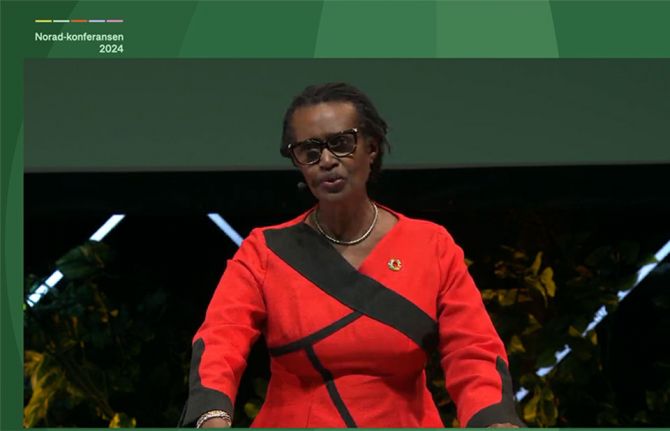
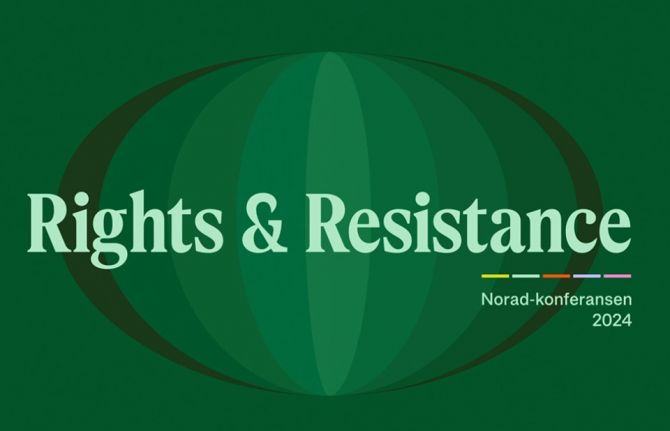
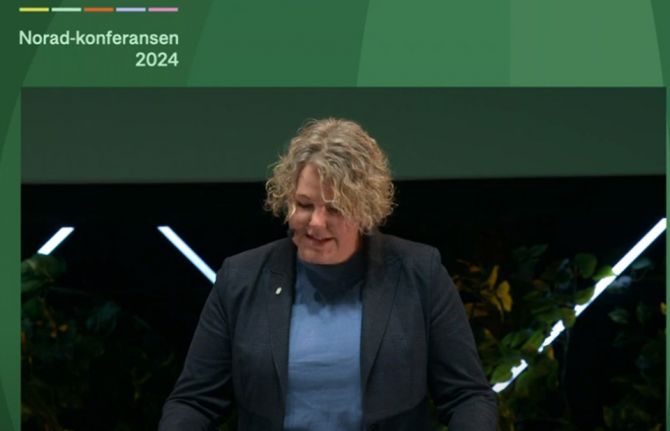
Press Release
UNAIDS Executive Director: let women and girls lead to protect and advance human rights globally
01 February 2024 01 February 2024OSLO/GENEVA, 1 February 2024—At a conference hosted in Oslo by the Norwegian Agency for Development Cooperation (Norad), UNAIDS Executive Director, Winnie Byanyima, has made an impassioned call to all international partners to support women and girls from marginalized communities at the frontlines of the defence of human rights. Only by ensuring that the rights of everyone are protected can the world ensure that the health of everyone is protected, and that the Sustainable Development Goals are achieved.
In her keynote speech at the Rights and Resistance conference Ms Byanyima said, “We cannot separate sustainable development from human rights. We must put human rights at the centre of our development efforts. The AIDS movement, of which I am proud to be part, has been resolute in this. We have demonstrated how patriarchal, racist, and homophobic laws, policies, practices and norms undermine health and hurt everyone.”
She said that progress was in peril from a backlash on human rights but that hard-won gains could be protected and expanded by doing three things:
- Deepening our understanding of the pushback on human rights and democracy
- Bringing our efforts together and connecting the dots to link the struggles, thinking long term and being bold
- Backing and resourcing the people most impacted by the attacks on rights—foremost by supporting women and girls from the poorest and most marginalized communities
In her speech, Ms Byanyima underlined some of the gains made by human rights defenders in recent years through the leadership of women and girls and LGBTQ communities.
- 50 million more girls are in school than were in 2015
- Whereas a few decades ago, two-thirds of countries criminalised same-sex relationships, today two-thirds of countries do not criminalise them.
Opening the conference, Norway’s International Development Minister, Anne Beathe Tvinnereim, said, “We have an obligation to back those who risk their lives fighting for values that we take for granted. Norway will continue aiding those actors on the ground who stress the universality of human rights. We will support free and independent media, including at the local level. Finally, all Norwegian development aid shall be rights-based."
Human rights violations continue to drive the HIV epidemic among women and girls. Every week, 4000 adolescent girls and young women aged 15—24 became infected with HIV globally in 2022. 3100 of these infections occurred in sub-Saharah Africa.
Upholding the rights of marginalized communities is vital for enabling success in the HIV response. When marginalized communities are criminalized or stigmatized, their vulnerability to HIV infection increases, and their access to HIV prevention, treatment, care, and support services is obstructed. UNAIDS research shows that the decriminalization of same-sex relationships is a crucial step in ending the AIDS pandemic.
UNAIDS is highlighting that the recent, well-coordinated and well-funded global pushback against women’s rights, against the human rights of LGBTQ people, against sexual and reproductive health and rights, against democracy and against civic space is not only a threat to everyone’s freedom, it is a threat to everyone’s health. In response to this threat, the AIDS movement and its allies are pushing back against the pushback, reminding world leaders of their commitments to uphold all human rights for all people.
UNAIDS is supporting frontline human rights defenders in both crisis response and in the longer-term work and is helping to expand support for human rights by demonstrating that laws, policies and practices which uphold human rights help countries to ensure public health and to get on track to end AIDS.
The UNAIDS Executive Director expressed confidence that the advancement of rights can be won. “Progress is not automatic. But if we are courageous and united, progress is possible,” said Ms Byanyima.
The full version of Ms. Byanyima’s speech (delivered at 12:50 CET February 1) can be viewed here.
UNAIDS
The Joint United Nations Programme on HIV/AIDS (UNAIDS) leads and inspires the world to achieve its shared vision of zero new HIV infections, zero discrimination and zero AIDS-related deaths. UNAIDS unites the efforts of 11 UN organizations—UNHCR, UNICEF, WFP, UNDP, UNFPA, UNODC, UN Women, ILO, UNESCO, WHO and the World Bank—and works closely with global and national partners towards ending the AIDS epidemic by 2030 as part of the Sustainable Development Goals. Learn more at unaids.org and connect with us on Facebook, Twitter, Instagram and YouTube.

Press Release
UNAIDS Board calls on member states to resource and tailor HIV response that integrates diverse needs of transgender people
19 December 2023 19 December 2023GENEVA, 19 December 2023—During the 53rd meeting of UNAIDS’ Programme Coordinating Board (PCB) held in Geneva, Switzerland, the UNAIDS board adopted decisions on key populations with a focus to increase access to HIV prevention, testing, treatment and other social protection services for transgender people.
Member states and the Joint Programme recognized that each key population, including transgender people, is diverse, and experiences multiple and intersecting forms of stigma and discrimination, and therefore requires evidence-based, data-informed tailored programmes, services and resources that are responsive to their specific needs in the HIV response.
Exact follow-up actions they agreed upon include:
- Address gaps in population size estimates and expand disaggregated data on key populations focusing on existing gaps in transgender populations, in diverse situations and conditions, including through community-led data generation;
- Optimally resource and scale-up tailored and effective HIV prevention, testing and treatment programmes and services that address the diverse needs and circumstances of key populations, including transgender people;
- Increase the proportion of community-led services for HIV prevention, testing and treatment and for societal enablers to reach the 30-80-60 targets, as described in the Global AIDS Strategy 2021-2026, including through mechanisms to increase and facilitate funding and sustainable financing for community-led HIV organizations, including for those led by key populations;
- Address gender inequality, all forms of stigma, discrimination and marginalization, and review and reform harmful and punitive laws and policies that hinder access to HIV-related services for key populations;
- Reinforce an evidence-based public health approach to HIV, particularly in the context of gender equality and human rights;
- Integrate social protection with health and HIV responses by taking people-centered approaches, which addresses economic inequalities making education, welfare, and social protection systems more inclusive of key populations.
And finally, the board requested UNAIDS to reinforce and expand the meaningful engagement and leadership of all key populations, including transgender people, in the HIV response.
This is the first time a member state-led UN body has adopted a consensus decision (without a vote) that includes specific references and commitments to transgender people and actions to be taken by member states. Deputy Executive Director of UNAIDS Christine Stegling said, “We have broken through a barrier. UNAIDS is now fully focused on maximizing the programmatic impact of this decision in-country, for communities and with communities.”
The past two PCB meetings took place midway through the Global AIDS Strategy 2021-2026 so this decision will help UNAIDS focus on achieving the 2025 targets. The UNAIDS PCB is the premier UN and global forum on HIV, bringing together civil society, cosponsors and member states to help chart the future of the response to HIV, including the development of the next Global AIDS Strategy, the vision for 2030 and beyond. The PCB NGO delegates are comprised of people living with HIV and/or key populations including transgender people. They participate in all aspects of the board’s work and strongly advocate for people living with HIV and affected by HIV.
UNAIDS
The Joint United Nations Programme on HIV/AIDS (UNAIDS) leads and inspires the world to achieve its shared vision of zero new HIV infections, zero discrimination and zero AIDS-related deaths. UNAIDS unites the efforts of 11 UN organizations—UNHCR, UNICEF, WFP, UNDP, UNFPA, UNODC, UN Women, ILO, UNESCO, WHO and the World Bank—and works closely with global and national partners towards ending the AIDS epidemic by 2030 as part of the Sustainable Development Goals. Learn more at unaids.org and connect with us on Facebook, Twitter, Instagram and YouTube.
UNAIDS Governance

Press Release
Governments commit to step up the global HIV response to end AIDS as a public health threat by 2030
14 December 2023 14 December 2023GENEVA, 14 December 2023—The 53rd meeting of UNAIDS’ Programme Coordinating Board (PCB) concluded today in Geneva, Switzerland, with Board members making strong commitments to redouble efforts to end AIDS by 2030.
In her remarks to the Board the Executive Director of UNAIDS Winnie Byanyima said, “I wish I could tell you now was the time to relax, but we are not done yet. And pulling back before we are done—that is how pandemics resurge; how the least powerful get left behind; how the virus thrives. In a pandemic, there is no standing still. If we do not make progress, the virus will.”
This PCB meeting took place at a critical time for the response to HIV, midway through the Global AIDS Strategy 2021-2026 as UNAIDS is redoubling its focus on achieving the 2025 targets.
The First Lady of Namibia, Monica Geingos, delivered the keynote address saying, “Partial success in the AIDS response coupled with emerging pandemics has given rise to complacency that must be reversed. Fresh thinking and approaches are urgently required to reach the 2025 targets and to achieve the goal of ending the pandemic by 2030.”
Addressing the shortfalls in global funding for HIV and for UNAIDS, Ms Byanyima urged donors to front-load resources, support developing countries to grow their fiscal space, and to fully fund UNAIDS with multi-year funding (UNAIDS currently has a shortfall of US$ 50 million). In 2022, US$ 20.8 billion was available for the global response to HIV, far short of the US$ 29.3 billion needed by 2025.
“We remain deeply concerned about the current funding situation of the Joint Programme and the expected impact on different strategic result areas. We are encouraging all PCB member states and observers to seek ways to augment their support to the Joint Programme in 2024,” said Binod Mahanty, Health Adviser, Federal Ministry of Health of Germany.
Several donors have recently increased their core contributions to UNAIDS, including Côte d’Ivoire, the Netherlands and the United States. During the meeting France announced a 50% increase in its voluntary contribution to UNAIDS, Germany announced an additional 1 million Euros, and Luxembourg announced an additional 100 000 Euros for UNAIDS.
Other countries have also stepped-up support recently, including Australia which announced an investment of up to AU$12 million for a new partnership with UNAIDS to let communities lead in ending AIDS in the Asia Pacific region. Let Communities Lead was the theme of this year’s World AIDS Day report from UNAIDS, which emphasized the critical role communities play in responding to HIV, and how underfunding and harmful barriers are holding back their lifesaving work and obstructing the end of AIDS.
“UNAIDS is a strong voice promoting human rights and fighting inequality, through the evidence-based work addressing the social determinants of HIV, including stigma and discrimination based on gender and sexual identity,” said, Ms Jannicke Graartrud Deputy Permanent Representative of Norway.
"UNAIDS has been providing Cambodia with important support through resource mobilization, a sustainability roadmap and strategic plan, strategic information and data collection and analysis, scale up of innovative prevention and treatment tools as well as on community engagement and strengthening community-led activities," said Mouly Ieng, Senior Minister, Chair of the National AIDS Authority of Cambodia, Phnom Penh. "Countries are making significant efforts, please do not leave us behind."
A thematic segment on HIV testing was held on the last day of the PCB. Board members discussed how HIV testing services are the gateway to HIV prevention, treatment, care and other support services. The Keynote speaker for the HIV testing segment was Professor Kevin Fenton CBE, Public Health England. He said, “In our efforts to end HIV transmission by 2030, we must let communities lead in redoubling our efforts to deliver what we know works – HIV prevention, testing, PrEP and HIV treatment – at scale. And we must work to end HIV stigma, which prevents so many from living their authentic life, full of compassion, free of fear and able to contribute fully to society.”
“Ending AIDS is possible but only if we take bold action to revolutionize HIV prevention, scale-up testing, fight stigma, discrimination and inequalities, reach young women and girls and key populations with HIV services, remove harmful laws, increase resources and strengthen the multisectoral approach,” said Ms Byanyima.
The UNAIDS PCB is the premier UN and global forum on HIV, bringing together civil society, co-sponsors and member states to help chart the co-creation of the future of the response to HIV, including the development of the next Global AIDS Strategy, the vision for 2030 and beyond.
The 53rd meeting of the PCB was chaired by Germany, with Kenya serving as the Vice-Chair and Brazil as Rapporteur. The 54th meeting to be held in June 2024, will be chaired by Kenya, with Brazil serving as Vice-Chair and the Netherlands as Rapporteur.
Read the Report to the Board by the UNAIDS Executive Director.
UNAIDS
The Joint United Nations Programme on HIV/AIDS (UNAIDS) leads and inspires the world to achieve its shared vision of zero new HIV infections, zero discrimination and zero AIDS-related deaths. UNAIDS unites the efforts of 11 UN organizations—UNHCR, UNICEF, WFP, UNDP, UNFPA, UNODC, UN Women, ILO, UNESCO, WHO and the World Bank—and works closely with global and national partners towards ending the AIDS epidemic by 2030 as part of the Sustainable Development Goals. Learn more at unaids.org and connect with us on Facebook, Twitter, Instagram and YouTube.
UNAIDS Governance

Press Release
To end AIDS in Africa, UNAIDS urges governments and partners to ramp up the response to HIV
09 December 2023 09 December 2023HARARE/GENEVA, 9 December 2023—Africa can end AIDS as a public threat, but to do so governments and international partners need to increase actions to reach everyone in need. Actions include accelerating treatment for children living with HIV and HIV prevention for adolescent girls, young women and key populations. Governments also need to support communities’ vital leadership role in the HIV response. This was the message from UNAIDS as the 22nd International Conference on AIDS and Sexually Transmitted Infections in Africa (ICASA) drew to a close.
At ICASA, thousands of delegates, including AIDS activists, grassroots communities, governments, private sector partners, key populations, doctors, scientists, donors and other international and African stakeholders came together to advance progress in the HIV response.
“Emerging from this conference we are clear. To end AIDS, governments and partners need to step up HIV prevention efforts. And they need to ensure that every person living with HIV has access to treatment, both current antiretroviral treatments and new longer-lasting injectable medicines, to live long and healthy lives,” said Winnie Byanyima, Executive Director of UNAIDS. “Collectively we are calling for health-justice and equality for all people, including people living with and affected by HIV. Pharmaceutical companies need to put people first over profits by making sure that treatment is affordable and easily accessible.”
While progress has been made in expanding access to antiretroviral treatment—too many people are still not accessing treatment, including 4.7 million people living with HIV in Africa. Children remain disproportionally affected—across Africa, only 55% of children living with HIV had access to antiretroviral therapy in 2022, compared with 83% of adults.
While 3 million children have been protected from HIV since 2000 by expanding access to antiretroviral treatment for mothers living with HIV, still there were 110 000 new infections among children (aged 0-14 years) in Africa in 2022.
HIV prevention services are also lacking, particularly for young women and adolescent girls, and gender inequalities continue to drive new infections in Africa. Among young people (aged 15-24) in Africa, 77% of new HIV infections in that age group were among young women, and 23% among young men in 2022.
“AIDS is an injustice of inequalities. If you look at people who are not accessing treatment and people who are dying of the disease, you will see how inequalities are obstructing their access to HIV services,” said Ms Winnie Byanyima. “We can end AIDS by redoubling our efforts to fight the pandemic, including by reaching people who are most affected by HIV, including young women and girls and key populations.”
Delegates attending the conference called for accelerated innovation to quickly turn the tide against AIDS. They called for the speedy rollout of new HIV prevention options such as long-acting injectable cabotegravir (CAB-LA) which can be administered once every two months to prevent HIV. The World Health Organization has urged countries to consider CAB-LA as a safe and highly effective prevention option for people at substantial risk of HIV infection.
In its World AIDS Day report Let Communities Lead, UNAIDS demonstrated that where communities are at the forefront of the AIDS response, countries were able to make significant progress. The report shows that AIDS can be ended as a public health threat by 2030 if communities on the frontlines get the full support they need from governments and donors, including political and financial backing.
Communities at the conference urged governments to recognize the important work they do. They called for the removal of obstructive laws criminalizing key populations, including LGBTQI people, people who inject drugs and sex workers. Criminalizing key populations prevents them from accessing HIV services, putting the fight against the pandemic at risk.
Non-governmental organizations working to end AIDS often have to operate with insufficient budgets and little political or no political support, limiting their full potential to do their work, including providing life-saving services. Governments need to increase political and financial support, especially for community-led responses and civil society organizations working to end AIDS. Authorities need also to guarantee safe operating environments for community-led organizations by removing harmful laws which criminalize key populations.
UNAIDS
The Joint United Nations Programme on HIV/AIDS (UNAIDS) leads and inspires the world to achieve its shared vision of zero new HIV infections, zero discrimination and zero AIDS-related deaths. UNAIDS unites the efforts of 11 UN organizations—UNHCR, UNICEF, WFP, UNDP, UNFPA, UNODC, UN Women, ILO, UNESCO, WHO and the World Bank—and works closely with global and national partners towards ending the AIDS epidemic by 2030 as part of the Sustainable Development Goals. Learn more at unaids.org and connect with us on Facebook, Twitter, Instagram and YouTube.

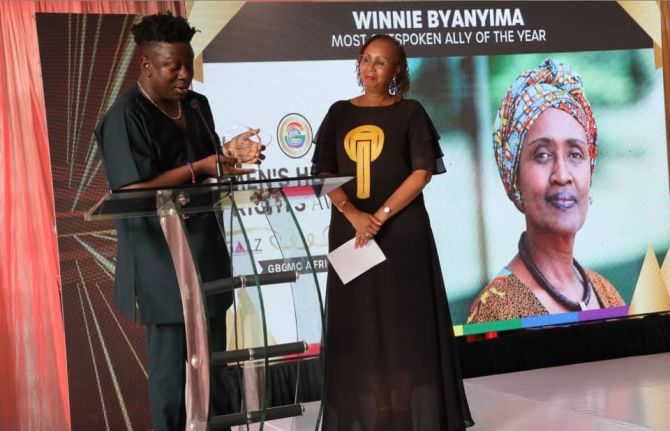
Press Release
Executive Director of UNAIDS awarded ‘Most outspoken Ally of the Year’ for her work supporting the rights of marginalized communities
08 December 2023 08 December 2023HARARE/GENEVA, 8 December 2023—The Executive Director of UNAIDS, Winnie Byanyima has been recognized as the ‘Most Outspoken Ally of the Year’ by Global Black Gay Men Connect for her extensive work advocating for the rights and well-being of marginalized communities. The announcement was made at the African Men Health and Rights award ceremony which took place today during the 22nd International Conference on AIDS and STIs.
“I am deeply honoured, and I accept this award on behalf of all the human rights and social justice warriors tackling inequalities around the world today,” said Ms Byanyima. “I will continue to be your outspoken ally, promoting inclusivity, fighting stigma and discrimination, and championing equal access to healthcare and human rights for all.”
“Your tireless advocacy for the rights and well-being of marginalized communities, including the LGBTQ+ community, has not gone unnoticed, said Michael Ighodaro, Co-founder, Global Black Gay Men Connect. “Your dedication is truly commendable. Your voice has been an unwavering source of support and inspiration for countless individuals and organizations across the globe.
Gay men and other men who have sex with men continue to be stigmatized and marginalized, keeping them away from health and social services and rendering them more at risk of becoming infected with HIV and less likely to seek treatment. In 2022, HIV prevalence amongst gay men and other men who have sex with men was almost 13% in Eastern and Southern Africa and 8% in West and Central Africa.
Today 67 countries still criminalize same sex relations. Evidence shows that criminalizing LGBTQI people for who they are and who they love prevents them from accessing HIV services. Even when they can access those services, they cannot do so with dignity due to the stigma and discrimination they face, which further exacerbates their vulnerability.
Countries that do not criminalize LGBTQI people are more likely to reach marginalized communities most affected by HIV. In recent years many African countries have moved away from the archaic laws that criminalize same sex sexual relations. Since 2016, Angola, Botswana, Gabon, Mauritius, and Seychelles have repealed laws criminalizing LGBTQI people. Progress has been uneven however, and alarming backsliding on punitive laws has been seen in a number of countries.
“Movements like Global Black Gay Men Connect is on the frontlines of the HIV response around the world. We must safeguard their leadership role to end AIDS and create a more just and equitable world.” said Ms Byanyima.
GLOBAL BLACK GAY MEN CONNECT
Global Black Gay Men Connect is an international, social justice platform that brings together black gay men from around the world to foster resilience against oppression and to advocate for the human rights and wellbeing of marginalized communities, including human rights centered HIV prevention and treatment services.
UNAIDS
The Joint United Nations Programme on HIV/AIDS (UNAIDS) leads and inspires the world to achieve its shared vision of zero new HIV infections, zero discrimination and zero AIDS-related deaths. UNAIDS unites the efforts of 11 UN organizations—UNHCR, UNICEF, WFP, UNDP, UNFPA, UNODC, UN Women, ILO, UNESCO, WHO and the World Bank—and works closely with global and national partners towards ending the AIDS epidemic by 2030 as part of the Sustainable Development Goals. Learn more at unaids.org and connect with us on Facebook, Twitter, Instagram and YouTube.
